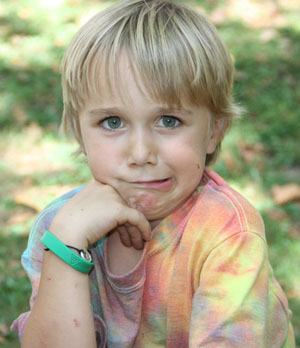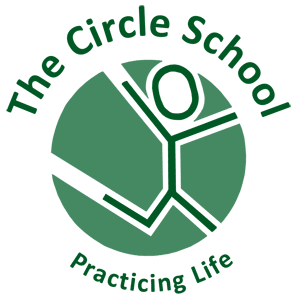“But how will my child know what she’s interested in if she never gets exposed to it?” This question has been addressed many times before, but I woke up this morning thinking about it, so here are my thoughts today.
Underlying this question is an assumption: “It is my responsibility as a parent to expose my child to worthwhile pursuits, and it is her opportunity to take them up or not.” I believe this assumption is exactly upside down. More on that in a minute. There’s another, subtler assumption in there too: “Learning is for children.” Or maybe the more insidious “Children are for learning.” There is also an implication that the adult knows what this child ought to be interested in.
Let’s turn the tables, and imagine your own parents asking the same question – how will you, dear reader know what you’re interested in if your parents don’t expose you to new possibilities? I’m 49 years old. I’m sure there are some aspects of my life for which my mom still feels responsible, but lucky for me she doesn’t interfere in my grown-up life much. But what if she did?
“Hey JD, wouldn’t you like to learn karate? Doesn’t that sound like fun?!”

You want me to learn WHAT?
“I noticed a spelling error on your blog. You know, Kaplan has some excellent spelling tutors, so I made an appointment for you next Tuesday.”
“I really want you to do well in your career, so I enrolled you in Penn State’s accelerated masters program in Chemistry. I want you to at least try it for a semester before you decide whether you like it or not.”
Gagging? That gag reflex is all about respect. Imagine your parents treating your life-long education like most of us treat our children’s primary and secondary educations! Yuck.
Why is it so obvious to us that grownups can find their own interests, but we think our children require a continuous loop of educational options paraded in front of them? With our adult friends (where respect is not optional), we enthuse about our own interests without expecting others to try them, and without assuming responsibility for others’ growth and learning. We can approach our children respectfully, too. Not only will it not deprive them, it will free up much-needed interpersonal space for them to grow into their best selves.
Back to the upside-down assumption I started with, in which parents feel responsible for presenting their child with learning opportunities. Flipped around, it goes: It is the child’s responsibility to search for passionate interests, and the parents’ opportunity to share their own interests, as friends do. In short, You are not responsible for finding cool stuff for your child to do (or like or learn)! Anyway, you can’t be responsible for that. You simply cannot divine what any given child needs to learn for her future life unless you have a direct line to an omniscient deity. School officials can’t, either. Who decided that a well-rounded education includes memorizing state capitals but does not include how to prevent a microphone from squealing?
I personally think that no one can claim a well-rounded education until they’ve held a durian fruit (carefully!), tasted a fresh kumquat, and enjoyed mango mochi on a hot day. (Right now you may be glad I’m not the curriculum director for your local school district.) Even though I want my children to be well-rounded, I would not say to my child: “Let’s go to the Asian grocery so you can learn about kumquats!” I would go to the Asian grocery because I love mochi or because I need a new rice cooker, and I might invite my child to come along, if it’s convenient. If he comes, I’d let him to explore a bit, and see what he is drawn to. He might find something amazing that I never noticed before (this happened a LOT in import stores when my kids were young). I would of course offer to share my mochi on the way out.
Learning is not for children; learning is for people. I’m sure my mom thinks she knows what I ought to be interested in, even at my age. But it’s my life, not hers. Always has been.
-JD Stillwater

I don’t know how many times I’ve heard this question at The Clearwater School. This is a great response to it, JD! I think it would be a boon to all of us if more people knew how to prevent a microphone from squealing. I especially like your statement that it is a child’s responsibility to search for passionate interests and a parent’s (or other adult’s) opportunity to share their own interests.
Great explanation! I love the way you brought the question into the adult world. It made it all the more ridiculous to think that your Mom might still be making you take “required” courses!
Right On! Thank you, JD. Liv’s newest observation after 5 months of public high school exposure (and 10 years of life at TCS) is, summarized- these kids just accept this place, they have no idea what a prison it is, they just have no idea. I never want to get used to a place like that and think it’s ok… never, for the rest of my life. With deepest gratitude to The Circle School,
Stef
Such a great answer to one of those questions we always hear. I love how, in breaking down the question, you provide a perfect answer. “Children are for learning.” Wow, a great take-off point to re-examine beliefs.
Thank you for this always valuable article. With our two now young adult kids we underwent an awakening around education and they ended up unschooling during their teen years, so I’m very familiar with the how will they get exposure question.
Here are some of the things I’ve found that people are thinking when they ask that question:
1. Kids are immature and inexperienced so how would they even begin to know how to find and pursue things? They can’t drive, don’t know how to research, don’t know what they don’t know. We do, so why deprive them of our experience?
2. We need all citizens of this country to have a certain base of knowledge in common about the country (like state capitals, civics)so we have the responsibility to teach them that.
3. I became an artist (not me, an example person) because of the fabulous art teacher I had in 5th grade…that wouldn’t have happened if I hadn’t met her. (Fill in any number of similar examples).
It was a learning process for us to shift into seeing the world as you describe in your article; most people that have brought up the exposure question with me have had one or more of these three things in mind and I find I end up addressing them. Usually the person doesn’t get it because it’s just too new a concept but with articles like yours, and discussions on our part, perhaps the closer we’ll get to helping others make the shifts we have!
Wonderful post, JD. Thanks for writing it.
When my son was a young Sudbury student, I never worried about exposure but wasn’t very articulate on the subject. I’m much more comfortable now – if I’d forced chess onto him, he may have never discovered fashion design, and piano lessons might have torpedoed his intense love of guitar. Who am I to decide? (Forced piano lessons would have torpedoed our relationship, for sure.)